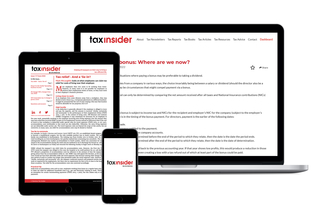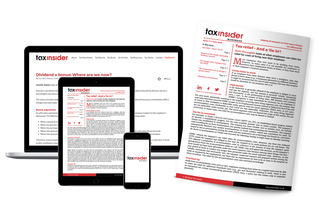New articles published
in August 2024
-
Keep it in the family! Introducing spouses
When maximising the tax efficiency of married couples (or couples in a civil partnership), one consideration should be whether both spouses’ tax allowances are being fully utilised. Where there are unused personal allowances, or one spouse pays tax at a lower marginal rate, bringing a spouse into a business can provide access to tax efficiencies.
Joe Brough considers how spouses and civil partners can be introduced into a business and tax traps to be aware of.
-
Enjoy some savings income tax-free gains
Sarah Bradford outlines how savings income is taxed and highlights options for earning savings income tax-free.
Rising interest rates and frozen tax thresholds may mean that you will now be liable for tax on your savings income when previously you were able to enjoy it tax-free. However, it is still possible to enjoy some savings income tax-free, regardless of the rate at which you pay tax.
-
Golden GAAP rules
HMRC has received a sound, repeated and unanimous thrashing at the courts over fundamental principles underpinning the taxation of profits. While involving share options through an employee benefit trust (EBT), this article covers the wider aspects of a case involving accounting adjustments.
Lee Sharpe looks at a recent case regarding tax and accounting principles and warns that, while welcome overall, the decisions in it were not entirely helpful.
-
A share transaction that nearly cost the loss of tax relief
Most trading company owners wishing to claim capital gains tax (CGT) business asset disposal relief (BADR) on an eventual sale of their shares need to satisfy certain conditions throughout a two-year period ending with the disposal.
Mark McLaughlin highlights a case where imprecision in a share transaction nearly cost a taxpayer the loss of tax relief.
-
Q&As with Arthur Weller
Some of our most popular articles
-
Extracting profits from your personal or family company
A company is a separate legal entity, distinct from the shareholders that own it. Consequently, if the directors and shareholders want to use the profits made by the company for their personal use, they will need to extract those profits first. There are various ways in which this can be done; some are more tax-efficient than others.
Sarah Bradford considers options for extracting profits from a company in a tax-efficient manner in the 2024/25 tax year.
-
Is HMRC playing ‘dividend detective’?
HMRC recently undertook a ‘One to Many’ letter campaign, wherein HMRC’s skilled data analysts undertake to mine nuggets from a huge range of sources to test for omissions or errors in tax returns.
Lee Sharpe reports on HMRC getting all ‘Nancy Drew’ with its sleuthing over company reporting and shareholders’ dividend income returns.
-
A little known but generous CGT relief
Some company shareholders may either be unaware or have forgotten about a relatively unknown capital gains tax (CGT) relief that offers a reduced CGT rate of only 10% on qualifying gains of up to £10m during their lifetime, if certain conditions are satisfied.
Mark McLaughlin highlights a relatively unknown and infrequently used but generous capital gains tax relief.
-
Extraction point: Extracting profits on cessation
Owner-managers can spend a significant amount of time and energy building a successful and profitable trading company.
Joe Brough looks at tax issues for business taxpayers and their tax advisers when a company is coming to an end.
-
Q&As with Arthur Weller
Subscription Benefits
We asked our subscribers what they love about Business Tax Insider.
These are the top 7 reasons that they gave us:
Monthly Newsletter
Business Tax Insider…





